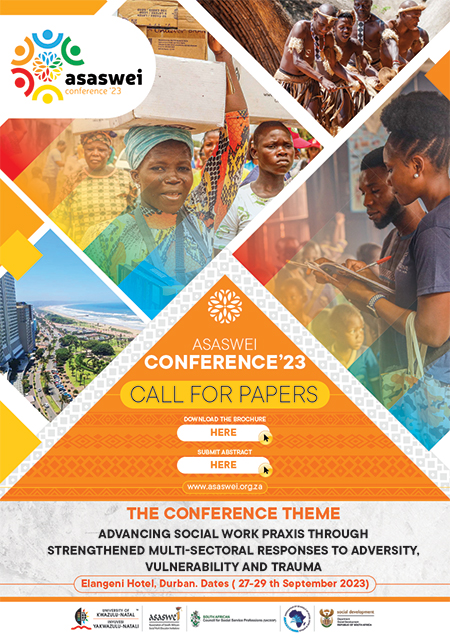The View page displays a submission's general information and data. Watch video
Submission information
Submission Number: 182
Submission ID: 284
Submission UUID: d373b630-6841-43f8-986a-28e95ca382b0
Submission URI: /2023/abstracts
Created: Thu, 07/27/2023 - 08:11
Completed: Thu, 07/27/2023 - 12:30
Changed: Wed, 08/16/2023 - 23:11
Remote IP address: 41.13.129.57
Submitted by: Anonymous
Language: English
Is draft: No
Current page: Complete
Webform: Abstract
Presenters
Ms.
Vilakazi
Nelisiwe Ignatia
Department of Social Development
Nelisiwe Ignatia Vilakazi is the Head of Department of Social Development in Kwa Zulu Natal, South Africa. Before assuming this position, she was the Deputy Director General at the National Department of Social of Development. She holds a Masters Degree in Social Work and is currently a PhD candidate. She is registered with the South African Council for Social Service Professions (SACSSP) as a social worker.
Yes
Prof.
Rautenbach
John Victor
University of Zululand
Prof John Victor Rautenbach is a Professor and Head of the Department of Social Work at the University of Zululand. He is a professional social worker registered with the South African Council for Social Service Professions (SACSSP). Previously he was the Head of the Department of Social Work and Social Development at the University of Fort Hare, where he worked for eighteen years.
He is a former Executive Committee Member of the Association of South African Social Work Education Institutions (ASASWEI). He has also served as a Board Member of the International Association of Schools of Social Work (IASSW), where he was the co-chair of the governance task force, a member of the Budget and Finance Committee and continues as the Chair of the Standing Committee on the World Census of Social Work Programs.
He is a former Executive Committee Member of the Association of South African Social Work Education Institutions (ASASWEI). He has also served as a Board Member of the International Association of Schools of Social Work (IASSW), where he was the co-chair of the governance task force, a member of the Budget and Finance Committee and continues as the Chair of the Standing Committee on the World Census of Social Work Programs.
No
Abstract
Developing a social development empowerment model for women's participation in poverty reduction programmes in Umzinyathi District-KwaZulu Natal
THEME 4: Quality management and enhancement of social services
SUB 4.2 Building professional capacity in social service professions through supervision, support, and development
Oral Presentation
Women who reside in rural areas and farms are particularly marginalized and live in extreme levels of poverty which are below the national income standard. Poverty continues to be on the agenda of many countries in the international arena. The history of apartheid characterised by systematic oppression and marginalisation of `black citizens has contributed to studies documenting the extent of poverty in South Africa. The study adopts a qualitative approach that has assessed the experiences of twenty women who participated in poverty reduction programmes in uMzinyathi District, in Kwa Zulu Natal. Interpretative Phenomenological Analysis is the design that enabled the researcher to delve into the circumstances of women influencing or impacting their participation in poverty reduction programmes. Further the study wss guided by an empowerment theory which asserts that poverty reduction programmes must consider the social and historical experience of the disadvantaged women in processes of enhancing their livelihood and development. The findings reveal that the majority of women (80%) who participated in poverty reduction programmes still remain poor despite government interventions. The study recommends the development of a social development empowerment model that will address gender inequality, social and economic prejudices against unemployed women.
Reviewer ONE Feedback
Dr
Busisiwe
Nkala-Dlamini
Yes
Empirical Research
Accepted
Reviewer TWO Feedback
{Empty}
{Empty}
{Empty}
Yes
Empirical Research
Accepted

